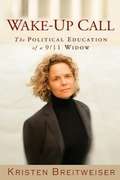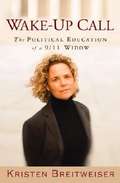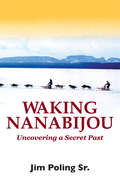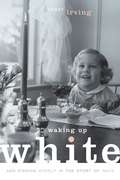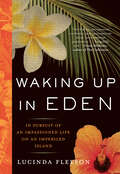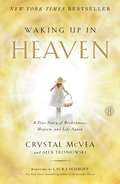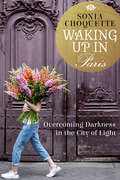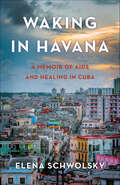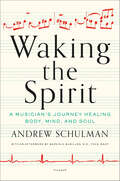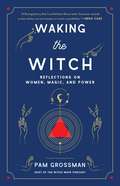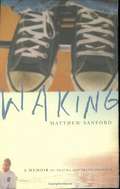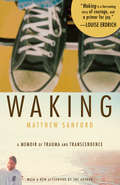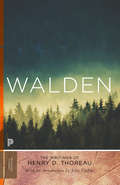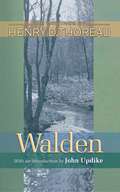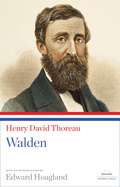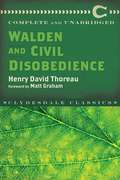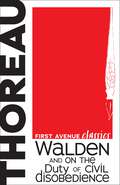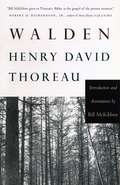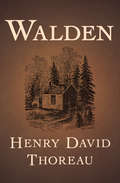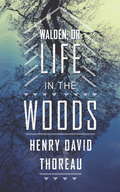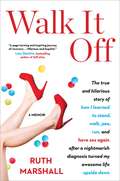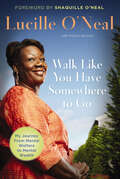- Table View
- List View
Wake-Up Call: The Political Education of a 9/11 Widow
by Kristen BreitweiserKristen Breitweiser was a happy young mother and housewife leading a privileged life. Then, on the morning of September 11th, 2001, the phone rang. It was her husband, Ron, calling from his office in the second tower."Sweets, I'm ok. I'm ok. Don't worry. It's not my building," he said.Kristen didn't know what he was saying. He told her to turn on the television. He continued."I see them. They're right there. Right across from me. And they're jumping. My God, they're jumping."The call ended abruptly and Kristen watched with horror as the second tower exploded. A huge, brilliant, red fireball. In that frozen instant, she felt in her heart that he had been killed.This is the deeply personal, often shocking and ultimately inspirational story of a woman left to pick up the pieces of a life shattered by terrorism. With no husband by her side or father for her child, Kristen had to find the strength within herself to embark on a journey that would lead first to the creation of the 9/11 Commission and then to her role as one of the country's most outspoken activists and critics of the current administration.
Wake-up Call
by Kristen BreitweiserBreitweiser, one of the nation's leading 9/11 activists, was a Republican and a suburban mother and housewife until her husband was killed in the September 11th terrorist attacks. The attack galvanized Breitweiser politically, and, along with three other 9/11 widows, she fought for the creation of the 9/11 Commission in the face of strong opposition from President Bush and many other top government officials. In this account, she describes her recovery from the nightmare of the attacks, and discusses cover-ups revealed during her campaign for the 9/11 Commission.
Waking Nanabijou: Uncovering a Secret Past
by Jim Poling Sr.A woman from Northern Ontario is buried; her earthly papers reveal a mystery. Veteran Canadian journalist Jim Poling took on the most important assignment of his career: Just who was his mother? Why did she take a lifelong secret to her grave?In his search for clues throughout his childhood years in Northern Ontario, the author goes to Chapleau, the railway town where the people he believed were his ancestors played out their roles in building the railway. It ends in the Prairie village of Innisfree, Alberta, home to Joe LaRose, convicted horse thief and father of a girl destined for trouble.A search that began in anger at his mother’s secrecy concludes with an understanding of her actions. In the process, he explores the place of families within Canadian society and reveals the shameful ongoing discrimination against Native Peoples and the abusive treatment of illegitimacy. Throughout, glimpses of working life in newsrooms add insider perspectives on the "handling" of our daily news.A former Indian Affairs reporter, Poling shares insights into the ongoing plight of Canada’s First Nations people. He observes that Canada will never realize its true potential until positive steps are taken to resolve longstanding issues.
Waking Up White, and Finding Myself in the Story of Race
by Debby IrvingWhite privilege. What is it, what does it mean? For twenty-five years, Debby Irving sensed inexplicable racial tensions in her personal and professional relationships. As a colleague and neighbor, she worried about offending people she dearly wanted to befriend. As an arts administrator, she didn't understand why her diversity efforts lacked traction. As a teacher, she found her best efforts to reach out to students and families of color left her wondering what she was missing. Then, in 2009, one "aha!" moment launched an adventure of discovery and insight that drastically shifted her worldview and upended her life plan. In Waking Up White, Irving tells her often cringe-worthy story with such openness that readers will turn every page rooting for her--and ultimately--for all of us.
Waking Up in Eden: In Pursuit of an Impassioned Life on an Imperiled Island
by Lucinda FleesonA woman journeys to Kauai to save Hawaii’s native plants: “Part history, part personal confession, part cautionary tale about environmental preservation” (Gioia Diliberto, author of Paris Without End). One day, Lucinda Fleeson quit her big-city newspaper job, sold her suburban house, and moved halfway across the world to the island of Kauai to work at the National Tropical Botanical Garden. Imagine a hundred-acre garden estate nestled amid ocean cliffs, rain forests, and secluded coves. Exotic and beautiful, yes, but as Fleeson awakens to this sensual world, exploring the island’s food, beaches, and history, she encounters an endangered paradise—the Hawaii we don’t see in the tourist brochures. Native plants are dying at an astonishing rate—Hawaii is called the Extinction Capital of the World—and invasive species (plants, animals, and humans) have imperiled this Garden of Eden. Fleeson accompanies a plant hunter into the rain forest to find the last of a dying species, descends into limestone caves with a paleontologist who deconstructs island history through fossil life, and shadows a botanical pioneer who propagates rare seeds, hoping to reclaim the landscape. Her grown-up adventure is a reminder of the value of choosing passion over security, individuality over convention, and the pressing need to protect the earth. And as she witnesses the island’s plant renewal efforts, she sees her own life blossom again. “[An] impeccably researched, beautifully told tale of how America’s most exotic locale transformed the life of an urban journalist.” —Gioia Diliberto “As she delves deep into the island’s history and ventures far into its delicate ecosystem, Fleeson undertakes her own personal and professional salvation, a spirited and daring pilgrimage that is both revelatory and enlightening.” —Booklist
Waking Up in Heaven: A True Story of Brokenness, Heaven, and Life Again
by Alex Tresniowski Crystal McVeaNew York Times bestseller! A remarkable and inspirational memoir about one woman's near-death experience, who was dramatically changed by the nine minutes she spent in heaven.On December 10, 2009, McVea, a thirty-two-year-old mother of four, went to the hospital for a routine procedure. While undergoing treatment, her face suddenly turned a dark shade of blue, then black. Her mother screamed for help, and a nurse tried to revive her…to no avail. Today, Crystal does not remember what happened in that hospital room during the nine minutes she was unconscious and unable to breathe on her own. She has no memory of the panic and the rushing nurses and the loud cries of &“Code Blue.&” She only remembers drifting off…and waking up in heaven. This unexpected meeting of a self-described sinner and skeptic with her God changed everything. Raised Christian, she had left her faith behind after childhood abuse and the subsequent struggles and suffering of her troubled teens and early adulthood. She longed to believe but felt abandoned, broken, and undeserving. A moving autobiographical testament to the power of divine love and forgiveness, Waking Up in Heaven shares the message of hope, healing, and compassion McVea brought back from her brush with God. This brave, honest account of years lost to shame and guilt will inspire those who&’ve stumbled along their own spiritual journey, with the uplifting reminder that no one is beyond the reach of grace and redemption, and that, in the words of the author, &“God is real. Heaven is real. And God&’s love for us is the realest thing of all.&”
Waking Up in Paris: Overcoming Darkness in the City of Light
by Sonia Choquette"As if waking up from a nightmare, I thought, If I am going to be traumatized, I might as well be traumatized in Paris, right?"Devastated by the unexpected end of her decades-long marriage, renowned spiritual teacher and intuitive guide Sonia Choquette undertook an equally unexpected move and relocated to Paris, the scene of many happy memories from her life as a student and young mother. Arriving in the aftermath of the Charlie Hebdo massacre, she found a Paris as traumatized by this unforeseen event as she had been by her divorce. Together, over the following years, she and the city she loves began a journey of healing that involved deep soul-searching and acceptance of new, sometimes uncomfortable, reality.In this follow-up to Walking Home, Sonia shares her intimate thoughts and fears, as well as the unique challenges of setting up a new life in a foreign land. From moving into a freezing, malodorous apartment, to a more pleasant —yet haunted —flat across the Seine, to her current light-filled home, Sonia shares how these changes parallel her inner transformation.Along the way, Sonia regales readers with vivid stories of her unfortunate encounters with French hairdressers and beauticians, her adventures in French fashion, and her search for the perfect neighborhood café. Her companion throughout is the city of Paris —a character unto itself —which never ceases to fill her with wonder, surprise, and delight, and provides her with the spiritual strength to succeed in establishing her new life.
Waking in Havana: A Memoir of AIDS and Healing in Cuba
by Elena SchwolskyIn 1972, when she was a young, divorced, single mother, restless and idealistic, Elena Schwolsky made a decision that changed her life: leaving her eighteen-month-old son with his father, she joined hundreds of other young Americans on a work brigade in Cuba. They spent their days building cinderblock houses for workers and their nights partying and debating politics. The Cuban revolution was young, and so were they. At a moment of transition in Schwolsky’s life, Cuba represented hope and the power to change. Twenty years later, she is drawn back to this forbidden island, yearning to move out of grief following the death of her husband from AIDS and feeling burned out after spending ten years as a nurse on the frontlines of the epidemic. Back in Cuba, she experiences the chaotic bustle of a Havana most Americans never see—a city frozen in time yet constantly changing. She takes readers along with her through her humorous attempts to communicate in a new language and navigate this very different culture—through the leafy tranquility of the controversial AIDS Sanitorium and into the lives of the resilient, opinionated, and passionate Cubans who become her family and help her to heal.
Waking the Spirit: A Musician's Journey Healing Body, Mind, and Soul
by Andrew SchulmanAn Oliver Sacks Foundation Best Book of the Year Selection, Finalist for the Books for a Better Life "Best First Book” Award, and a People Magazine Pick in nonfiction.The astounding story of a critically ill musician who is saved by music and returns to the same hospital to help heal othersAndrew Schulman, a fifty-seven-year-old professional guitarist, had a close brush with death on the night of July 16, 2009. Against the odds—and with the help of music—he survived: a medical miracle.Once fully recovered, Andrew resolved to use his musical gifts to help critically ill patients at Mount Sinai Beth Israel’s ICU. In Waking the Spirit, you’ll learn the astonishing stories of the people he’s met along the way—both patients and doctors—and see the incredible role music can play in a modern hospital setting.Schulman expertly weaves cutting-edge research on neuroscience and medicine, as well as what he’s learned as a professional musician, to explore the power of music to heal the body and awaken the spirit.
Waking the Witch: Reflections on Women, Magic, and Power
by Pam GrossmanA whip-smart and illuminating exploration of the world’s fascination with witches from podcast host and practicing witch Pam Grossman (The Witch Wave), who delves deeply into why witches have intrigued us for centuries and why they’re more relevant now than ever. When you think of a witch, what do you picture? Pointy black hat, maybe a broomstick. But witches in various guises have been with us for millennia. In Waking the Witch, Pam Grossman explores the cultural and historical impact of the world’s most magical icon. From the idea of the femme fatale in league with the devil in early modern Europe and Salem, to the bewitching pop culture archetypes in Buffy the Vampire Slayer, Sabrina the Teenage Witch, and Harry Potter; from the spooky ladies in fairy tales and horror films to the rise of feminist covens and contemporary witchcraft, witches reflect the power and potential of women. In this fascinating read that is part cultural analysis, part memoir, Pam opens up about her own journey on the path to witchcraft, and how her personal embrace of the witch helped her find strength, self-empowerment, and a deeper purpose. A comprehensive meditation on one of the most mysterious and captivating figures of all time, Waking the Witch celebrates witches past, present, and future, and reveals the critical role they have played—and will continue to play—in shaping the world as we know it.
Waking: A Memoir of Trauma and Transcendence
by Matthew SanfordThis memoir about a car accident that ended the lives of two of the author's family members and rendered the author a paraplegic describes how the surviving family members picked up the pieces of their lives, his recuperation at the Mayo Clinic, and his decision to become a disabled yoga instructor.
Waking: A Memoir of Trauma and Transcendence
by Matthew SanfordMatthew Sanford's inspirational story about the car accident that left him paralyzed from the chest down is a superbly written memoir of healing and journey—from near death to triumphant life.Matt Sanford's life and body were irrevocably changed at age 13 on a snowy Iowa road. On that day, his family's car skidded off an overpass, killing Matt's father and sister and left him paralyzed from the chest down, confining him to a wheelchair. His mother and brother escaped from the accident unharmed but were left to pick up the pieces of their decimated family.This pivotal event set Matt on a lifelong journey, from his intensive care experiences at the Mayo Clinic to becoming a paralyzed yoga teacher and founder of a nonprofit organization. Forced to explore what it truly means to live in a body, he emerges with an entirely new view of being a "whole" person. By turns agonizingly personal, philosophical, and heartbreakingly honest, this groundbreaking memoir takes you inside the body, heart, and mind of a boy whose world has been shattered. Follow Sanford's journey as he rebuilds from the ground up, searching for "healing stories" to help him reconnect his mind and his body. To do so, he must reject much of what traditional medicine tells him and instead turn to yoga as a centerpiece of his daily practice. He finds not only a better life but also meaning and purpose in the mysterious distance that we all experience between mind and body.In Waking, Sanford delivers a powerful message about the endurance of the human spirit and of the body that houses it.
Walden
by Henry D. ThoreauOne of the most influential and compelling books in American literature, Walden is a vivid account of the years that Henry D. Thoreau spent alone in a secluded cabin at Walden Pond. This edition--introduced by noted American writer John Updike--celebrates the perennial importance of a classic work, originally published in 1854. Much of Walden's material is derived from Thoreau's journals and contains such engaging pieces from the lively "Where I Lived, and What I Lived For" and "Brute Neighbors" to the serene "Reading" and "The Pond in the Winter." Other famous sections involve Thoreau's visits with a Canadian woodcutter and with an Irish family, a trip to Concord, and a description of his bean field. This is the complete and authoritative text of Walden--as close to Thoreau's original intention as all available evidence allows. This is the authoritative text of Walden and the ideal presentation of Thoreau's great document of social criticism and dissent.
Walden
by Henry David Thoreau Stephen FenderIn 1845 Henry David Thoreau began a new life, spending most of each week for over two years in a rough hut he built himself on the northwest shore of Walden Pond, just a mile and a half from his home town of Concord, Massachusetts. Walden is Thoreau's autobiographical account of this experiment in solitary living, his refusal to play by the rules of hard work and the accumulation of wealth and, above all, the freedom it gave him to adapt his living to the natural world around him. This new edition traces the sources of Thoreau's reading and thinking and considers the author in the context of his birthplace and his sense of its history - social, economic, and natural. In addition, an ecological appendix provides modern identifications of the myriad plants and animals to which Thoreau gave increasingly close attention as he became acclimatized to his life at Walden. Long-revered by political reformers and environmentalists, Walden is here reassessed by Stephen Fender, whose edition is based on research into the material conditions of Thoreau's life in Concord, and the town's place in the history of mid-nineteenth-century New England. [This text is listed as an example that meets Common Core Standards in English language arts in grades 11-12 at http://www.corestandards.org.]
Walden
by Henry David Thoreau<P>To celebrate the 150th anniversary of the original publication of Thoreau's classic work (which is cited in Books for College Libraries, 3rd ed.), this special edition is published in cooperation with the Walden Woods Project, a nonprofit organization founded in 1990 to preserve the land, literature, and legacy of Thoreau. The text includes a brief introduction by E. O. Wilson. <P>[This text is listed as an example that meets Common Core Standards in English language arts in grades 11-12 at http://www.corestandards.org.]
Walden
by Henry David ThoreauIn 1845 Henry David Thoreau left his pencil-manufacturing business and began building a cabin on the shore of Walden Pond near Concord, Massachusetts. This lyrical yet practical-minded book is at once a record of the 26 months Thoreau spent in withdrawal from society -- an account of the daily minutiae of building, planting, hunting, cooking, and, always, observing nature -- and a declaration of independence from the oppressive mores of the world he left behind. Elegant, witty, and quietly searching, Walden remains the most persuasive American argument for simplicity of life clarity of conscience. For the first time, the authoritative editions of works by major American novelists, poets, scholars, and essayists collected in the hardcover volumes of The Library of America are being published singly in a series of handsome paperback books. A distinguished writer has contributed an introduction for each volume, which also includes a chronology of the author's life and career, an essay on the text, and notes. From the Trade Paperback edition.
Walden and Civil Disobedience (First Avenue Classics Ser.)
by Henry David Thoreau Matt GrahamPackaged in handsome, affordable trade editions, Clydesdale Classics is a new series of essential works. From the musings of academics such as Thomas Paine in Common Sense to the striking personal narrative of Harriet Jacobs in Incidents in the Life of a Slave Girl, this new series is a comprehensive collection of our intellectual history through the words of the exceptional few.First published in 1854, Walden was written by the renowned transcendentalist Henry David Thoreau about his experience living off the land at Walden Pond for more than two years. Thoreau divides his deliberations and meditations into a variety of sections which include his views on economy and the natural world, the importance of reading and literature, the values of both solitude and companionship, and other personal reflections. In addition to Walden, this edition also includes Thoreau’s essay on Civil Disobedience, which discusses his views on the nature of government and its negative effects on society.With a new foreword by survivalist Matt Graham, venture into the woods with Thoreau and explore the complexities of life and truth in this classic piece of American literature.
Walden, and On the Duty of Civil Disobedience (First Avenue Classics ™)
by Henry David ThoreauIn these two American literary classics, Henry David Thoreau offers readers his experiences and thoughts on how to live a more fulfilling life and stand up for what is right. Having spent two years living in solitude at Walden Pond, he stresses the importance of a quiet, reflective life and the rewards of a nonmaterialistic existence in Walden. His essay "On the Duty of Civil Disobedience" discusses his belief in nonviolent protests against an unjust government—in particular, he attacks the US government's approval of slavery and support for the Mexican-American War. These unabridged versions were first published in 1854 and 1849, respectively, but their ideas are timeless.
Walden: Introduction and Annotations by Bill McKibben (Concord Library)
by Henry David Thoreau Bill MckibbenFirst published in 1854, Henry David Thoreau's groundbreaking book has influenced generations of readers and continues to inspire and inform anyone with an open mind and a love of nature. With Bill McKibben providing a newly revised Introduction and helpful annotations that place Thoreau firmly in his role as cultural and spiritual seer, this beautiful edition of Walden for the new millennium is more accessible and relevant than ever. [This text is listed as an example that meets Common Core Standards in English language arts in grades 11-12 at http://www.corestandards.org.]
Walden: Large Print
by Henry David Thoreau<P>An American masterwork in praise of nature, self-reliance, and the simple lifeI went to the woods because I wished to live deliberately, to front only the essential facts of life, and see if I could not learn what it had to teach, and not, when I came to die, discover that I had not lived. <P>In 1845, the transcendentalist Henry David Thoreau moved from his home in the town of Concord, Massachusetts, to a small cabin he built by hand on the shores of Walden Pond. <P>He spent the next two years alone in the woods, learning to live self-sufficiently and to take his creative and moral inspiration from nature. P <P>art memoir, part philosophical treatise, part environmental manifesto, Walden is Thoreau's inspirational account of those extraordinary years and one of the most influential books ever written.
Walden; Or Life in the Woods
by Henry David ThoreauA multi-faceted classic of American literature and philosophy. At the beginning of the book, Thoreau leaves his civilized life behind, planning to live in the wilderness for two years to discover what a simpler, purer life has to offer him. He builds a home for himself near Walden pond, and begins on a journey of discovery. Throughout the course of the book Thoreau mixes in-depth explanations of how he lived with reflective musings on what his life of tranquility, simplicity, and closeness with nature taught him. Penguin Random House Canada is proud to bring you classic works of literature in e-book form, with the highest quality production values. Find more today and rediscover books you never knew you loved.
Walk In My Shoes
by ed. Charlotte J. DewittUsher Syndrome is a rare genetic disease that causes deafblindness. This anthology includes 27 authors writing about their experiences.
Walk It Off: The True and Hilarious Story of How I Learned to Stand, Walk, Pee, Run, and Have Sex Again After a Nightmarish Diagnosis Turned My Awesome Life Upside Down
by Ruth MarshallFuriously Happy meets Elaine Lui in this truly original—and surprisingly hilarious—memoir about one woman’s journey to learn how to walk after a debilitating diagnosis turned her life upside down.Learn How to Walk (Again) To-Do List: Step 1: Stand Step 2: Step Step 3: Pee (Yes!) Step 4: Walk with walker Step 5: Walk with sticks Step 6: Walk without props Recreational interlude for sex Step 7: RUN! Ruth Marshall—power mom, wife, actor, and daughter—was in great health, until one day, her feet started to tingle. She visited doctors and specialists for tests, but no one could figure out the cause of her symptoms. Was she imagining those pesky tingles? She tried to brush it off, even as she tripped over curbs and stumbled into people. Clumsiness is charming, right? But when Ruth suddenly couldn’t feel her legs at all, she knew something was terribly wrong. Her fears were confirmed by an MRI revealing a rare tumour that had been quietly growing on her spine for more than a decade. Within days, surgery was scheduled, and after the intense eight-hour ordeal, Ruth woke up to find her legs and feet had forgotten how to do...well, everything. The question that burned in her mind was, “Will I ever walk again?” What Ruth thought would be three days in the hospital turned into months of rehabilitation as she relearned not only how to walk, run, pee, and even have sex again, but how to better appreciate everyone around her—including her devoted husband, her two young sons, her worried parents, her sisters, her loving friends, and the caring staff at the rehab center who help her tackle her recovery head-on. Laugh-out-loud outrageous and searingly honest, this is a memoir that not only entertains but inspires readers to put their best foot forward and walk off anything life throws their way.
Walk Like You Have Somewhere to Go: My Journey from Mental Welfare to Mental Health
by Allison Samuels Lucille O'Neal“In Walk Like You Have Somewhere to Go Lucille will take you on a 40-year journey from ‘mental welfare to mental wealth.’ You will laugh—you may cry—and in the process you will be encouraged, enlightened, and empowered.”—Paula White, author of Dare to Dream: See Yourself as God Sees You As the mother of one of the greatest athletes of all time, her journey is exceptional; but her story reveals that she is more than just “Shaquille O’Neal’s mom.”Lucille O’Neal is a woman you know, a woman you understand. Perhaps your own journey resembles hers. O’Neal has been a rebellious teen, a single mother, a wife, a college student, a divorcée, and, above all, a woman of unique courage. Acquainted early in life with turmoil, O’Neal’s circumstances shaped her perspective and strengthened her resolve to overcome the challenges she would encounter later in life. She has endured poverty, rejection, abuse, addiction, and the illness of a child, yet today her faith and compassion for others are stronger than ever. O’Neal writes candidly—and often humorously—about her years of spiritual unrest and mental warfare, and her return to the God of her childhood.In Walk Like You Have Somewhere to Go, O’Neal shares her struggles and disappointments against the backdrop of her sweetest memories and proudest accomplishments. After fifty-five years, O’Neal has gained the wisdom to recognize her wrongs and guide others down a different path. Her story is proof that it’s never too late for a new beginning.
